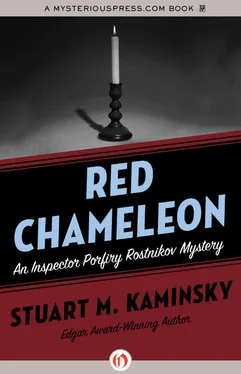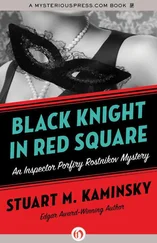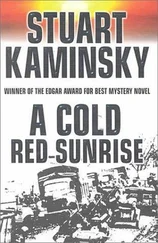Stuart Kaminsky - Red Chameleon
Здесь есть возможность читать онлайн «Stuart Kaminsky - Red Chameleon» весь текст электронной книги совершенно бесплатно (целиком полную версию без сокращений). В некоторых случаях можно слушать аудио, скачать через торрент в формате fb2 и присутствует краткое содержание. Год выпуска: 2012, ISBN: 2012, Издательство: MysteriousPress.com/Open Road, Жанр: Полицейский детектив, на английском языке. Описание произведения, (предисловие) а так же отзывы посетителей доступны на портале библиотеки ЛибКат.
- Название:Red Chameleon
- Автор:
- Издательство:MysteriousPress.com/Open Road
- Жанр:
- Год:2012
- ISBN:978-1-4532-6632-8
- Рейтинг книги:4 / 5. Голосов: 1
-
Избранное:Добавить в избранное
- Отзывы:
-
Ваша оценка:
- 80
- 1
- 2
- 3
- 4
- 5
Red Chameleon: краткое содержание, описание и аннотация
Предлагаем к чтению аннотацию, описание, краткое содержание или предисловие (зависит от того, что написал сам автор книги «Red Chameleon»). Если вы не нашли необходимую информацию о книге — напишите в комментариях, мы постараемся отыскать её.
Red Chameleon — читать онлайн бесплатно полную книгу (весь текст) целиком
Ниже представлен текст книги, разбитый по страницам. Система сохранения места последней прочитанной страницы, позволяет с удобством читать онлайн бесплатно книгу «Red Chameleon», без необходимости каждый раз заново искать на чём Вы остановились. Поставьте закладку, и сможете в любой момент перейти на страницу, на которой закончили чтение.
Интервал:
Закладка:
Rostnikov stood up with the help of the table, because, as usual, his leg had begun to stiffen. Sofiya watched and, he noticed, rubbed her own crippled leg. As he moved to the door, she rose, took a step toward him, and looked up at his face with a question. He opened his arms, and she put her head on his chest. He held her, patted her head, and waited for her to weep. He felt her cheek against his shoulder, her breasts against his chest, and wondered how long it had been since anyone had held and comforted Sofiya Savitskaya. He wondered, in fact, if she had ever been held and comforted, and inside himself he wept for her.
They stood that way for several minutes, and she was so silent that Rostnikov thought she might have fallen asleep. He could feel her breathing against him.
“I must go,” he said gently, but she didn’t move back. He took her arms and held her a few inches away as he repeated, “I must go,” and then he sat her in the kitchen chair. Her eyes were closed, and her shoulders remained close together as if she had been hypnotized.
“I will come back when I know more,” he promised, going to the door. The woman did not move. He went out and closed the door noiselessly behind him. Then he paused to listen. If she cried, he might go back, invite her for dinner, stay with her and tell his life story, spin a tale about Isola in America, about Ed McBain’s world of police who caught criminals and knew nothing of politics, of police who were supported by their system, policemen named Carella, Meyer, Kling, and Brown, of policemen in a nightmare world but one in which they could comfort each other and those they encountered who were the victims of the madness.
Rostnikov went home. He wondered when he looked up at the evening sun if Sofiya Savitskaya would remain in that chair, her shoulders together, her eyes closed, until a prince came who would break the spell. Rostnikov felt the grit and sweat under his rapidly wilting collar and knew he was no prince. He was, at best, a comic knight or a guardian of the secret, but he was no prince.
He almost wandered into a hole in the street clearly marked with a sign indicating remont, or repair, and he put off going home by entering a bakery where the line to find out the price was reasonably short. He got the price and then went to the line to pay the cashier. Ten minutes later he had gone through the third line, the one to pick up the bread, and was on his way home.
“Let’s go to a movie,” he growled when he finally returned to his apartment and saw Sarah, her red hair tied back, her face solemn, her dress dark, placing food on the table.
She stopped, looked at him with her hands on her hips, and cocked her head to one side, which reminded him of the way she had looked one afternoon in 1962 when he had teased her about going on a vacation. He remembered that it was 1962, because he had just finished the investigation of the murder of the three shoe-store clerks on Lenin Prospekt, and he had been feeling wonderful.
“The Mir has a French movie about Napoleon and Josephine,” she said, testing him, for she knew that Porfiry Petrovich Rostnikov’s taste went to action films and comedies.
“The Mir sounds perfect,” he said, putting his bread on the table.
“Maybe, we could find-” Sarah began, ready to concede some ground.
“The Mir it shall be,” he said. “We will eat after I lift my iron babies. I will wash, and we will lose ourselves in decadent history and French romanticism. You smile? Does that mean we shall hold hands and kiss in the darkness like children?”
“You were never a child, Porfiry Petrovich,” she said, checking something cooking that smelled sweet and indefinable to Rostnikov, who had begun to remove his clothes and prepare himself for his beloved weights. It would, he decided, be a perfect night. He would merge with the weights, sweat upon his own sweat, exhaust himself, and eat. He would eat as if he were in a terrible contest in which he had to extract all taste and savor all odors to win. Then he would go with Sarah to the French movie and love it, talk about it, imagine himself Napoleon. For one night he would not be in Moscow. One night. That was all he could do, and deep down he thought that was all he really wanted to do.
EIGHT
Emil Karpo opened his eyes, expecting to see the gray sky above the roof of the Ukraine Hotel. Instead, he saw pale gray walls, the solid, unsmiling face of Porfiry Petrovich Rostnikov, and he heard voices around him.
“I saw a French movie last night,” Rostnikov said, looking down at him. “The French laugh too much, with too little feeling and with almost no reason. Do you agree?”
“I’m not an expert of the French mentality,” Karpo croaked through his painfully dry throat. He realized now that he was in a bed, in a hospital.
A man was standing beside the chief inspector. He was about forty with a birdlike chest and glasses with wire rims that made him look like an intellectual from a 1930s movie about the Revolution.
“The woman who fell from the roof,” Rostnikov said. “She was the Weeper?”
Karpo nodded.
“This is Monday morning,” Rostnikov said. “I’m going to sit on your bed.” He did. “They didn’t call me yesterday when it happened. I think it was Procurator. Khabolov’s way of punishing me for the destruction of his Chaika. Well, you are supposed to be curious. You are supposed to be amused. You are supposed to be burning with curiosity about this destroyed Chaika, and you just lie there.”
“Comrade inspector,” Karpo whispered painfully, “I have neither a sense of humor nor a morbid curiosity about the humiliation of others.”
“See?” said Rostnikov, turning to the man with the glasses. “Didn’t I tell you he would steal his way into your heart, Alex?”
“You told me he would steal his way into my heart,” Alex agreed, moving forward to Emil Karpo’s side and looking down at him intently.
“She jumped,” Karpo said, his eyes on those of Rostnikov’s companion. “I will detail it in my report. Did she injure anyone in her fall?”
“No, no one, though the street had to be closed off for almost half an hour, I understand. The rifle she had with her went through the window of a clothing shop.”
Karpo took in the six other patients in the ward room. None had a visitor; three were displaying mild curiosity about Karpo and his guests, and three were in no condition to respond to their environment.
The man named Alex put his hand on Karpo’s forehead, leaned down to look into his eyes, and then reached for the numb right arm.
“Comrade inspector, I take it this man is some kind of health professional and not a morbid lunatic you encountered in the hall,” Karpo said, watching his arm being lifted, seeing the dingy gray sleeve of his gown slide back, feeling a tingling in the fingers as the man examined.
“See, Alex, I told you he had a sense of humor. He can deny it all he likes, but Emil Karpo could make a living as a comedian.”
“He is very funny,” Alex agreed blankly as he ran his hand over the limp arm and bent it at the elbow.
“Alex is a doctor,” Rostnikov whispered, “but we will keep that a secret. The woman who is supposed to be your physician would not take consultation with exuberance. Alex is my wife’s cousin. Remember? He went to a real doctor’s school in Poland.”
Alex prodded away, ignoring Rostnikov, who continued, “On the way in we stopped at the X-ray department and told a slight lie which enabled Alex to examine your X rays.”
“They were botched.” Alex sighed, working ahead. “But I could see enough. I just want to be sure …” He rolled Karpo’s shoulder firmly and caused a pain that brought a minor grimace to Karpo’s pale face.
Читать дальшеИнтервал:
Закладка:
Похожие книги на «Red Chameleon»
Представляем Вашему вниманию похожие книги на «Red Chameleon» списком для выбора. Мы отобрали схожую по названию и смыслу литературу в надежде предоставить читателям больше вариантов отыскать новые, интересные, ещё непрочитанные произведения.
Обсуждение, отзывы о книге «Red Chameleon» и просто собственные мнения читателей. Оставьте ваши комментарии, напишите, что Вы думаете о произведении, его смысле или главных героях. Укажите что конкретно понравилось, а что нет, и почему Вы так считаете.












